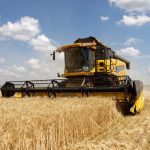Spring planting in Alberta made a 27-point jump at 47 per cent complete during the week ended May 13, according to the latest crop report from the province. That's 21 points above the five-year average.


Moisture levels still strong despite declines

Most fields still have good soil moisture

Soil moisture conditions very from region to region

Canola drops back March to March

But year-to-date exports nearly 7.40 million tonnes

Cold snap halts spring seeding



Farmers also seeding more peas, corn and oats

Futures no longer connected to cash market